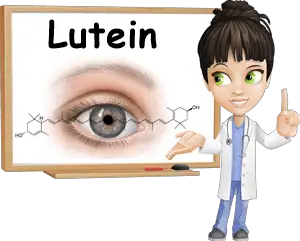A pigment with powerful antioxidant properties, lutein is physically found in our retina as well as in an area situated near the center part of the retina and called the macula lutea.
Lutein is a carotenoid or an organic pigment that occurs naturally in green leafy vegetables and yellow-orange plants. It is best known for its benefits on vision, protecting against degenerative eye diseases by absorbing free radicals from light that may cause cell damage.
There is not much research on the benefits of lutein outside its importance for eye health. However, it has been theorized that its antioxidant properties may help with other conditions that are a result of free radical damage such as cancer, diabetes or cardiovascular disease caused by clogged arteries due to the oxidation of lipids (LDL cholesterol).
However, lutein has been found to be effective only for eye-related conditions at this point, but research is ongoing.

What is lutein and what does it do?
Lutein is a carotenoid antioxidant and essential nutrient for eye health and good vision. As a powerful antioxidant carotenoid, it reduces risks of developing cataract and helps prevent a condition called age-related macular degeneration (AMD), or loss of central vision. Macular degeneration occurs naturally as a result of old age.
Nutritional deficiencies, genetics, disease and free radical damage affect eye health directly, causing damage that produces physical changes significant enough to impair normal vision. Our body does not synthesize or produce lutein itself, so we need to meet our daily requirements from dietary sources or dietary supplements.
The nutrient-pigment being physically present in the retina and macula lutea area of our eyes, good eyesight would not be possible without it. What is interesting is that getting enough lutein has been shown to lead to improve pigment density in the macula lutea area of the retina (Dietary modification of human macular pigment density). In addition to this, the carotenoid absorbs blue light, a source of free radicals that can damage the retina causing impaired vision over time.
It basically filters and blocks radiation from blue light, preventing it from reaching sensitive areas of the eye and producing oxidative damage.
But lutein does not work alone: it needs another carotenoid called zeaxanthin (as well as meso-zeaxanthin which our body synthesizes from lutein) to provide an ideal antioxidant protection against the harmful effects sun radiation has on the eyes. Zeaxanthin also accumulates in the retina, but is more abundant in the macula lutea (an area somewhere near the middle of the retina), while lutein is present in greater amounts in other parts of the retina.

Together, the two nutrients filter light to minimize free radical damage on the eye. But because our body doesn’t produce lutein (or zeaxanthin), a diet rich in greens and yellow-orange fruits and vegetables is crucial for providing the needed amounts. Although there are currently no recommendations regarding how much lutein one should consume, an estimated daily dose of 6 mg from food sources or around 11 (some say 20) mg from dietary supplements is said to be enough to prevent or slow the progression of macular degeneration.
However, only a trained medical professional can tell you what the best doses of lutein are for you. Moreover, the nutrient has been found to be particularly efficient for those already deficient in it. If you have been prescribed lutein food supplements by your doctor, then you should also make sure you are eating enough healthy fats to help ensure and improve absorption.
Another benefit of the nutrient is it helps improve visual acuity, basically helping us see clearer and better, colors included. Moreover, there have been reports that lutein supplementation helps improve symptoms of loss of vision such as flashing lights (indicative of damage to the retina) and foggy vision.
Lutein: list of benefits
All things considered, the carotenoid lutein is good for the following:
- Stopping the progression of age-related macular degeneration (AMD), a degenerative eye disease causing loss of central vision.
- Improving macular degeneration symptoms such as foggy vision or flashes of light.
- Improving visual acuity by promoting clarity of vision, sharpness and color vividness.
- Potentially helpful for cataract prevention, but does not reverse it once it develops.
Best lutein food sources
Where is lutein found? The best food sources for the carotenoid are: green leafy and non-leafy vegetables such as dandelion greens, kale, turnip greens, collard greens, spinach, watercress, romaine lettuce, Brussels sprouts, broccoli, zucchini, eggs (the egg yolk) and orange and yellow fruits and vegetables such as yellow tomatoes, orange and yellow carrots, yellow corn, yellow watermelon, pumpkin and squash. Lutein is also found in poultry fat (which is yellow, indicative of the presence of the carotenoid).
RDI and deficiency symptoms
When there is an insufficient dietary intake of lutein, deficiencies may occur. However, there are no particular signs and symptoms of lutein deficiency. Preliminary studies indicate that a low dietary intake of lutein encouraging a prolonged, severe deficit considerably increases the risk of developing macular degeneration and cataract. Similarly, research suggests those who consume moderate to high amounts of fruits and vegetables and thus have a good lutein intake show a 57% lower risk of developing cataract and macular degeneration.
Although there are no clear guidelines on how much lutein we should consume on a daily basis for best benefits, the carotenoid remains an essential nutrient for eye health. While science continues to scour for answers, we should keep to a healthy, varied, nutritious dietary regimen, rich in fresh fruits and vegetables. This way we meet our daily demands of important nutrients such as lutein, a potent ‘eye vitamin’ which protects the retina from radiation and free radicals in light.
